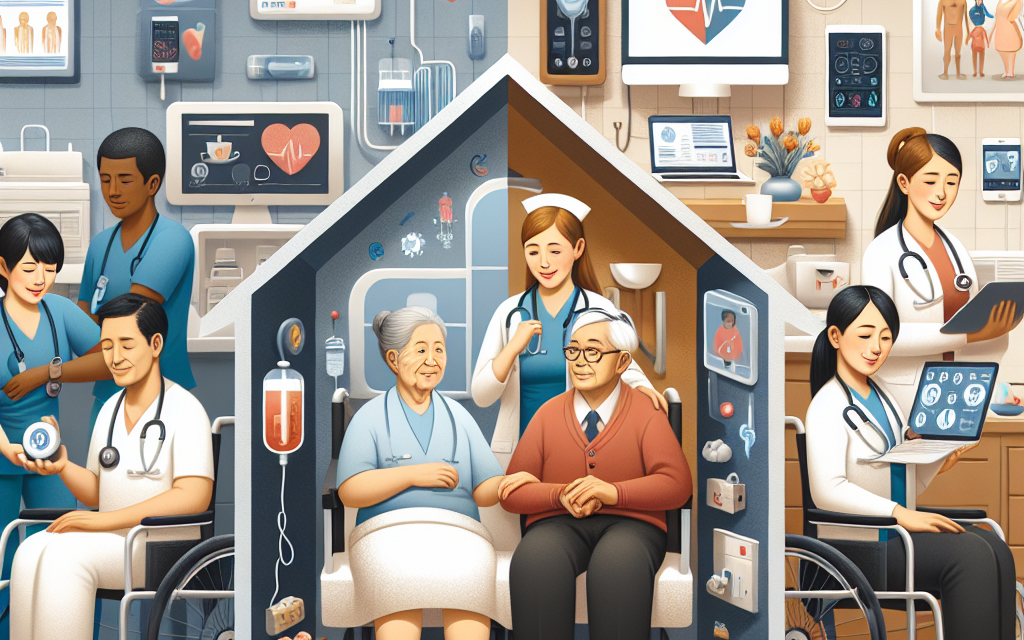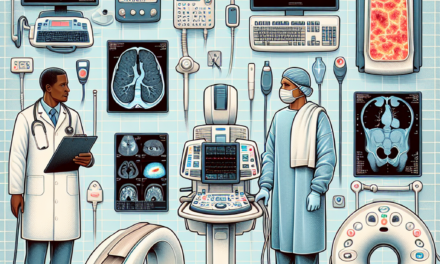Transforming Patient Care: The Impact of Home-Based Healthcare Services
In recent years, the healthcare landscape has undergone a significant transformation, with home-based healthcare services emerging as a vital component of patient care. This shift is driven by various factors, including the aging population, advancements in technology, and a growing emphasis on patient-centered care. Home-based healthcare services not only enhance the quality of care but also improve patient outcomes and reduce healthcare costs. This article delves into the multifaceted impact of home-based healthcare services, exploring their benefits, challenges, and future potential.
The Rise of Home-Based Healthcare Services
The concept of home-based healthcare is not new; however, its adoption has accelerated in recent years. Several factors contribute to this trend:
- Aging Population: The global population is aging, with the World Health Organization projecting that by 2050, there will be 2 billion people aged 60 years and older. This demographic shift necessitates a reevaluation of healthcare delivery methods.
- Technological Advancements: Innovations in telemedicine, remote monitoring, and mobile health applications have made it easier for healthcare providers to deliver care in the home setting.
- Patient Preferences: Many patients prefer receiving care in the comfort of their homes, where they feel more relaxed and less anxious than in traditional healthcare settings.
- Cost-Effectiveness: Home-based care can be more cost-effective than hospital stays or nursing home care, reducing the financial burden on patients and healthcare systems.
- Chronic Disease Management: With the rise of chronic diseases, home-based healthcare services provide ongoing support and monitoring, which is crucial for effective disease management.
As a result of these factors, home-based healthcare services have gained traction, leading to a more patient-centered approach to care. This section will explore the various types of home-based healthcare services available today, including home health aides, telehealth services, and palliative care.
Types of Home-Based Healthcare Services
Home-based healthcare services encompass a wide range of services designed to meet the diverse needs of patients. Understanding these services is essential for recognizing their impact on patient care.
- Home Health Aides: These professionals assist patients with daily activities such as bathing, dressing, and meal preparation. They play a crucial role in supporting patients with mobility issues or chronic illnesses.
- Telehealth Services: Telehealth allows patients to consult with healthcare providers remotely through video calls or phone consultations. This service is particularly beneficial for those with mobility challenges or those living in rural areas.
- Skilled Nursing Care: Registered nurses can provide skilled nursing care at home, including wound care, medication management, and monitoring vital signs. This service is essential for patients recovering from surgery or managing complex health conditions.
- Physical and Occupational Therapy: Therapists can deliver rehabilitation services in the home, helping patients regain strength and independence after illness or injury.
- Palliative and Hospice Care: These services focus on providing comfort and support to patients with serious illnesses, ensuring they receive compassionate care in their final days.
Each of these services plays a vital role in transforming patient care by providing personalized support tailored to individual needs. For instance, a study published in the Journal of the American Geriatrics Society found that home health aide services significantly improved the quality of life for elderly patients, reducing hospital readmissions and enhancing overall satisfaction with care.
Benefits of Home-Based Healthcare Services
The benefits of home-based healthcare services extend beyond mere convenience. They encompass a wide array of advantages that contribute to improved patient outcomes and satisfaction.
- Improved Patient Outcomes: Studies have shown that patients receiving home-based care experience better health outcomes, including lower rates of hospital readmissions and improved management of chronic conditions.
- Enhanced Patient Satisfaction: Patients often report higher satisfaction levels when receiving care at home, as it allows them to maintain their independence and comfort.
- Cost Savings: Home-based care can significantly reduce healthcare costs by minimizing the need for hospital stays and emergency room visits.
- Personalized Care: Home-based services allow for tailored care plans that address the unique needs of each patient, fostering a more holistic approach to health.
- Family Involvement: Home-based care encourages family members to participate in the care process, strengthening support systems and improving patient morale.
For example, a case study conducted by the University of California, San Francisco, found that patients with chronic obstructive pulmonary disease (COPD) who received home-based care had a 30% reduction in hospital admissions compared to those who received traditional care. This highlights the effectiveness of home-based services in managing chronic conditions and improving overall health outcomes.
Challenges Facing Home-Based Healthcare Services
Despite the numerous benefits, home-based healthcare services also face several challenges that can hinder their effectiveness and accessibility.
- Regulatory Barriers: Home healthcare providers often navigate complex regulations that can limit their ability to deliver services efficiently. These regulations can vary significantly by state and may create inconsistencies in care delivery.
- Insurance Coverage: Many insurance plans do not adequately cover home-based services, leading to financial burdens for patients and families. This lack of coverage can deter patients from seeking necessary care.
- Workforce Shortages: The demand for home healthcare services is growing, but there is a shortage of qualified professionals to meet this demand. This workforce gap can lead to longer wait times for patients and reduced quality of care.
- Technology Barriers: While technology plays a crucial role in home-based healthcare, not all patients have access to the necessary devices or internet connectivity, particularly in rural areas.
- Coordination of Care: Ensuring seamless communication and coordination among various healthcare providers can be challenging, leading to fragmented care and potential gaps in treatment.
Addressing these challenges requires a concerted effort from policymakers, healthcare organizations, and communities. For instance, initiatives aimed at expanding insurance coverage for home-based services could alleviate financial burdens and improve access to care. Additionally, investing in workforce development programs can help address the shortage of qualified professionals in the field.
The Future of Home-Based Healthcare Services
The future of home-based healthcare services looks promising, with several trends and innovations poised to shape the industry.
- Increased Use of Telehealth: The COVID-19 pandemic accelerated the adoption of telehealth services, and this trend is likely to continue as patients and providers recognize its benefits.
- Integration of Artificial Intelligence: AI technologies can enhance home-based care by providing predictive analytics, improving patient monitoring, and streamlining administrative tasks.
- Focus on Preventive Care: Home-based healthcare services are increasingly emphasizing preventive care, helping patients manage their health proactively and reduce the risk of complications.
- Collaboration with Community Organizations: Partnerships between healthcare providers and community organizations can enhance access to resources and support for patients receiving home-based care.
- Personalized Medicine: Advances in genomics and personalized medicine will enable healthcare providers to tailor treatments to individual patients, further enhancing the effectiveness of home-based care.
As these trends continue to evolve, home-based healthcare services will play an increasingly vital role in the overall healthcare system. For example, a report from the National Institute on Aging highlights that integrating telehealth with home-based services can lead to improved management of chronic diseases, ultimately enhancing patient quality of life.
Conclusion
Home-based healthcare services are transforming patient care by providing personalized, accessible, and cost-effective solutions for individuals with diverse health needs. The rise of these services is driven by an aging population, technological advancements, and a growing emphasis on patient-centered care. While challenges remain, the benefits of home-based healthcare are undeniable, with improved patient outcomes, enhanced satisfaction, and significant cost savings.
As we look to the future, the continued evolution of home-based healthcare services will be shaped by innovations in technology, a focus on preventive care, and collaborative efforts among healthcare providers and community organizations. By addressing the challenges and leveraging the opportunities presented by home-based care, we can create a more effective and compassionate healthcare system that meets the needs of all patients.
In summary, the impact of home-based healthcare services is profound, offering a transformative approach to patient care that prioritizes individual needs and preferences. As we embrace this shift, it is essential to continue advocating for policies and practices that support the growth and sustainability of home-based healthcare services, ensuring that all patients have access to the care they deserve.





